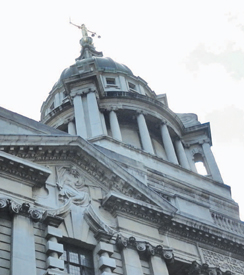In the 1960s, UK Government was temperamentally secretive and Harold Wilson as Labour prime minister took pains to stay abreast of any security breaches, even if only for the sake of retaining control of the government machine. How embarrassing was it, then, for a member of the ‘security commission’ set up by government to speak out of turn? A National Archives file, BA 19/63 shows the story.
The Tory PM Alec Douglas-Home had set up the security commission in January 1964, to investigate a breach of security in public service. Its members were impeccable and of high rank; in July 1965 for instance, they were General Sir Dudley Ward; Lord Caccia; Lord Justice Winn, a court of appeal judge; the retired former head of the civil service, Lord Norman Brook; and Admiral Sir Caspar John. Three would sit on a case. While the members were non-political, cases would be political affairs. For example, after the embarrassing escape of the convicted spy George Blake from Wormwood Scrubs prison in London in 1966, the Conservative Opposition leader Edward Heath raised it in the House of Commons, and called for the commission to be used.
In the wake of the Blake escape, then, in December 1966 a confidential note came to the head of the civil service Sir Laurence Helsby. It was passing on ‘excellent evidence that at a recent dinner party in another person’s house, Lord Justice Winn had described at least in general terms the exchange he had had with your earlier in the year about the representation of civil servants before the security commission. It seems that he spoke indiscreetly in uncomplimentary terms about yourself and most disparagingly about civil servants as a class’. The note gave a second example of ‘indiscretions’ at a dinner party which supposedly amazed ‘some very hardened barristers who were present’. Nothing had come of it.
The commission reported in June 1965, having first met in May 1965. On the criticism that witnesses should have ‘protection’, whether a legal adviser alongside them, or at least a friend, the commission decided there was no need, because the evidence given to the commission would not be used for any disciplinary offence. In June 1965, the commission heard from Helsby, and the director-general of the security services, Martin Furnival-Jones; and two policemen from Special Branch. The commission was only fact-finding, where security had gone wrong.
Harold Wilson wrote to Sir Harold Kent, asking him to join the commission after the death of Norman Brook in August 1967. Past experience, Wilson wrote, suggests ‘that the commission does not need to be activated very frequently’. Even so, Harold Caccia resigned in February 1968, claiming that he lacked time, because he had become chairman of Standard Telephones and Cables. He had not served on either of the investigations in the first three years.
They were the cases of Squadron Leader Rien, who had classified documents at home; and a temporary shorthand typist in the Cabinet Office, who in June 1967 was found guilty of passing classified documents. The commission was not activated when charred classified waste was found on Chislehurst Common in January 1967. The file described it as ‘a straightforward technical problem which had not in fact given rise to the actual breach’. Government also wanted to avoid publicity; Heath, evidently informed by Wilson as leader of the Opposition, agreed. The atomic reactor at Winfrith was found to have been deliberately damaged (that you might imagine was more serious than whatever an office temp could do), but there was no breach of security. And in March 1968, a radio operator on HMS Euryalus talked indiscreetly in New Zealand about electronic warfare equipment and his ship’s movements. The file described it as ‘a clear case of personal failure’; but difficult to investigate, the file admitted, when most of those in the case were in New Zealand. Publicity was a factor because the commission’s reports were published officially (Cmd 2722, 3151, 3365 and 3865).
The press in November 1968 reported the court case of Able Seaman Cloude, a former radio plotter on an anti-submarine frigate, HM Duncan. He was jailed for five years at the Old Bailey, after pleading guilty to an offence under the Official Secrets Act. He visited the Russian embassy in May 1968, as he wanted money for a house that his young wife wanted. A confidential note on file rated security on HMS Duncan as ‘very satisfactory’. However, the case showed how someone’s domestic problems – well-known to Cloude’s officers, and not out of the ordinary in the Navy, in this case – got around any physical security. Officers had offered to negotiate a chargeable loan for Cloude, who refused. The Navy, the file stated, had no reason ‘to suspect that a man who had always shown himself to be sound, steady, sensible and rational, would go to the extreme of visiting the Russian embassy with an offer to disclose information.’ Cloude overshadowed another case of the same day, an RAF chief technician. As Cloude was guilty of a ‘momentary lapse’, there was no need for the commission, according to the file.
At Aldershot court in December 1968, Clive Bland, a Ministry of Technology photo-printer at the Royal Aircraft Establishment, pleaded guilty to an offence under the Official Secrets Act. He was fined for passing classified information to the Russian embassy.










